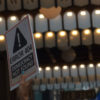 Alex Fattal is an assistant professor in the Department of Film-Video and Media Studies at Penn State University. His research analyzes the central role that the media plays in Colombia’s armed conflict through long-term ethnographic research. This combination of subject and method has led him to a research agenda that is deeply interdisciplinary, drawing on the social sciences, humanities, Latin American studies and the documentary arts. His writing has been published by American Ethnologist, Anthropological Quarterly, Public Books, and Sensate to name a few. The National Science Foundation, the Social Science Research Council, the Wenner-Gren Foundation, and the Swedish Institute, as well as institutional grants from Harvard University, where he completed his PhD in anthropology and a Mellon postdoctoral fellowship, have funded his research.
Alex Fattal is an assistant professor in the Department of Film-Video and Media Studies at Penn State University. His research analyzes the central role that the media plays in Colombia’s armed conflict through long-term ethnographic research. This combination of subject and method has led him to a research agenda that is deeply interdisciplinary, drawing on the social sciences, humanities, Latin American studies and the documentary arts. His writing has been published by American Ethnologist, Anthropological Quarterly, Public Books, and Sensate to name a few. The National Science Foundation, the Social Science Research Council, the Wenner-Gren Foundation, and the Swedish Institute, as well as institutional grants from Harvard University, where he completed his PhD in anthropology and a Mellon postdoctoral fellowship, have funded his research.
How did you first become interested in studying media politics and the war with the Revolutionary Armed Forces of Colombia (FARC)?
I first traveled to Colombia on a Fulbright grant immediately after my undergraduate studies, and I became fascinated with how the war was portrayed by the Colombian media. The anchorpeople of the nightly news would recount the day’s tragic events as if they were commenting on a football game. I became particularly interested in how photojournalists portrayed the conflict. I felt (since I knew so little at the time) that media representations of the armed conflict gave short shrift to the people most affected by it, so I started a project teaching photography to young people, many of whom had been displaced. They took photographs of their own lives, and those photos became the jumping-off point for storytelling exercises. That project, “Shooting Cameras for Peace,” took on a life of its own and kept drawing me deeper into Colombia and the questions that swirl around the representation of violence.
What do you think will be the biggest challenges facing the FARC as it transitions into a political party?
That’s hard—there are so many! The leadership needs to maintain cohesion after coercion. By that I mean to say that now that they can’t force their former fighters to obey orders, they’ll need to try to find a way to make the political process as meaningful as possible for the FARC’s rank and file. There’s also the economic challenge of creating functional economic cooperatives to reduce the temptation former combatants might find in the country’s still-flourishing illegal economies (drugs, mining, extortion). Even if they don’t have much success at the polls, they need to build a narrative. They’ve been trying to do that, and they have made a concerted effort to adapt to the digital age. (That’s something I will be looking at more in my next research project.) But there is no shortage of obstacles in their path, the biggest being the fact that the peace accord is severely hobbled by a lack of popular support. Media-savvy detractors on the Right have, so far, been much more successful at framing the narrative than supporters of the agreement have.

How does documentary film-making connect to your scholarly research?
It makes me a more perceptive observer, for one. It also activates a narrative part of my brain that is helpful for my academic writing. I start to think of my texts as films, and my films as texts. It’s hard to articulate, but there’s a great complementarity. I like working on a creative project at the same time as I am writing books and articles—they tend to cross-fertilize in unexpected ways. I like to think about what one modality does that the other can’t, but then I start questioning those limits. That said, doing any single project well, whether it’s a creative documentary or a more conventional piece of scholarship, is challenging; working across mediums means serious overtime, but I enjoy it.
What do you find to be the most interesting or exciting parts of your work?
Well, I am finishing a film—Dreams from the Concrete Mountain—about a former guerrilla fighter that I recorded in the back of a truck that I transformed into a camera obscura. The visual effect is one in which the world is projected upside down over his body as the truck moves through urban and rural landscapes. The immediate goal is to release the project as an experimental documentary short, which I hope will be exciting.
In thinking past the documentary, right now my mind is racing about the prospect of creating an installation in which I park the truck in a gallery space and invite the public to watch the film inside the truck, so they are in the same oneiric, psychoanalytic, confessional space in which the project was recorded. The form of the film is generative: it moves the protagonist to delve into his dreams, which turn out to be quite revealing. The ultimate goal is to portray this complex figure, who is both a perpetrator and a victim, in a way that does not shy away from complexity and contradiction, and contributes to a conversation about how to reintegrate ex-combatants into society. If I had the backing, I would make this project into not only an installation, but also a transmedia experience and mobile cinema initiative.
I am in the process of writing about the methodology, which instantiates what I am calling a surrealist visual ethnography, in that it tries to hold a dialectical tension between the ethnographic impulse to render the strange familiar, and the surrealist impulse to make the familiar strange. There’s so much I want to do with this project. I just finished writing two books, so I am hoping to find the time in 2018.
Conversely, what would you say are the biggest challenges in your work?
My work is very ethnographic. I want theory to emerge organically from my ethnography, but I think one consequence of that approach is that the work might be undertheorized. In one of the books that I’ve just sent to press, Guerrilla Marketing: Counterinsurgency, Capitalism, and the Demobilization of FARC Rebels in Colombia (University of Chicago, 2018), I am worried that I have left some theoretical discussions too implicit. It’s a byproduct of wanting to be read outside of academia while also being interesting to academics. I am hoping to hit a “crossover” sweet spot, but as a young scholar, it’s hard to know where that sweet spot is.

You paused your graduate education for two years to lobby for the release of your brother, Josh, one of three American hikers jailed in Iran after getting too close to the Iraq-Iran border. You started an organization, Free the Hikers, with your family and the other two families to advocate tirelessly for their release and garnered the support of activists such as Desmond Tutu and Muhammad Ali. How did that affect you?
It might sound weird, but it’s something I haven’t really processed yet. I paused my life and career for two years, and when it was over I just pressed the resume button. I got on with my work, and then my friend and roommate, Roméo Langlois, a French reporter, was shot and held captive by the FARC. I was involved in solidarity in that case, so it came back in a way. I am sure the ordeal has had an unconscious impact, but it’s hard to say what. I guess the main thing the experience gave me was a greater ability to empathize with the suffering of other people experiencing traumatic events. I won the IDRF, but then my brother was taken captive and I didn’t go on my fellowship until after my family’s ordeal was resolved (more than 25 months later). I think having gone through that harrowing experience before going to the field made me a more sensitive researcher.
My academic work is on the politics of mediation, but during that ordeal it was much more than academic—my brother’s life was on the line, so it gave me a whole different way of approaching the topic. Coordinating the Free the Hikers campaign validated my intuition that I was researching an important topic. It’s hard to know to what extent all of our advocacy activities contributed to the freedom of my brother and his two friends, but it felt like an important dimension. That gave me the sense that dedicating such a big chunk of my life to understanding the media’s role in political strife and international affairs was worthwhile.

Do you remember your IDRF application process? Any advice for applicants?
First off, to those who are applying for an IDRF, I would say work with your friends. I worked closely with two friends in my department. We tore each others’ proposals apart. It was a wonderful workshop experience. All three of us won the grant, which was nice. Even if it doesn’t work out that well, there’s something to be said for intensive peer feedback that really improves a project and is extremely intellectually rewarding.
How did receiving an IDRF award impact your graduate education?
The IDRF helped me connect with an amazing network of scholars through a fun workshop in New Orleans. I am still in touch with some of them. The money and camaraderie were both extremely timely supports during the fieldwork and writing stages. Being a part of the SSRC/IDRF community, dispersed as it is, also made both research and writing less isolating.
What advice would you give to incoming IDRF fellows?
Enjoy it. Bracket out the anxieties of academic life and delve into your research project. Easier said than done, I know. Also, write while in the field. Not only field notes—write chapter outlines, write ethnographic scenes. Write while it’s fresh.
What do you do outside of teaching and research for fun?
Things I really enjoy doing, in no particular order: playing basketball, lying in a hammock and reading a novel until I doze off, drinking mezcal, waxing performative while reinterpreting Bob Dylan lyrics. I want to start taking contemporary dance classes—I’ve been meaning to do that for a long time. I love the names of the dance styles: flying low, contact.













